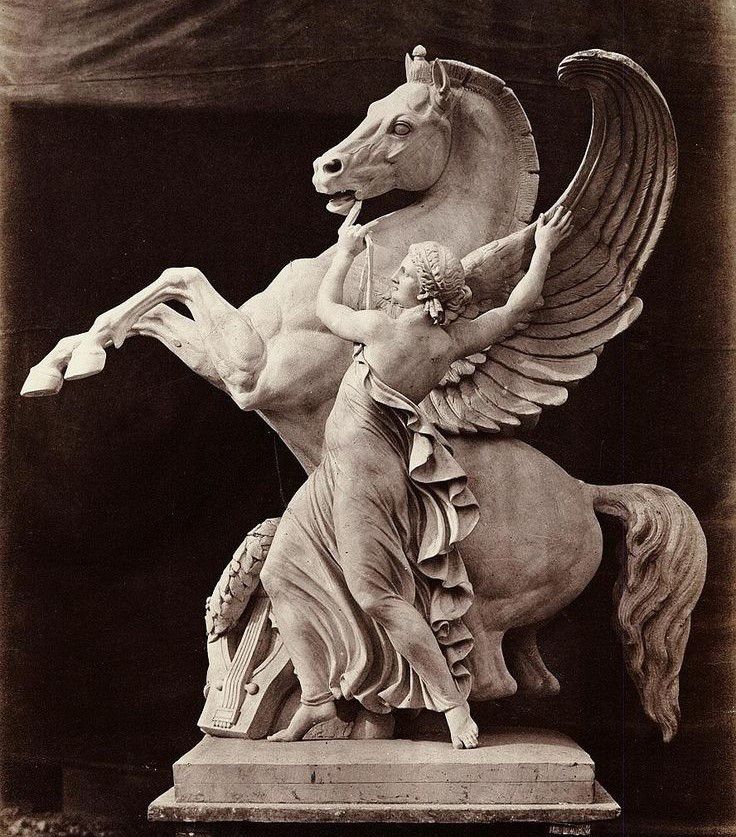Pheme / Fama / Ossa
Have you guys ever wondered if in ancient Greece there has been a god or a goddess that was the representation of fame and renown?
The answer is: Yes!
And this goddess goes by the name Pheme (in ancient Greek: Φήμη); and literally translates as fame.
Her Roman name was Fama while she also goes by the name of Ossa; which means "a pair of eyes".
Pheme was said to be the daughter of Elpis - the Goddess of Hope, who was called Spes in Latin.
According to Virgil, in his Aeneid, she was said to be the daughter of Gaia and Ouranus; which would make her a kickass Titan goddess.
Her prime responsibility was to act as a messenger of Zeus and to spread around his messages or orders.
Pheme, was described as "she who initiates and furthers communication" and had an altar at Athens.
Apart from it though, she was loved or feared, mostly by the mortals, because she could either make you or break you.
If we were to describe her, she would be the PR-atomic-bomb of ancient times.
If Pheme liked you, you would become noticeable, famed and renowned in a very positive way.
If Pheme disliked you, she would destroy your fame and reputation by spreading scandalous rumours.
For example, a tremendous gossip, Pheme was said to have pried into the affairs of mortals and gods, then repeated what she learned, starting off at first with just a dull whisper, but repeating it louder each time, until everyone knew.
She pissed off so many people that forced a few of them to give us a description of her and her powers.
Hesiod calls her "an evil thing", because she is "a light weight to lift up..., but heavy to carry, and hard to put down again" and it never disappears completely, once people talked about her.
Virgil, in his Aeneid, describes her as being small and fearful at first, then growing larger and stronger, as rumours are meant to do, until She fills the sky, standing with her head hidden by storm clouds.
He calls her a "dreadful monster" who never sleeps, and describes her as having swift feet and great wings with which she flies, spreading rumour quickly; he also says that at the base of every feather is an eye, an ear, and a mouth, which she uses to see, hear, and then disperse her rumours, slander, and outright lies.
And according to Ovid in his Metamorphoses, Fama lives at the center of the world, where earth, sea, and sky meet; from there she can see and hear everything that goes on in the world.
Her home on a tall peak has no doors but instead has a thousand windows and is made entirely of bronze, so that the slightest noise or whisper echoes and reverberates throughout.
What is more, In Homer's Iliad, Ossa walks among the soldiers, to hasten them in battle.
In the Odyssey, Telemachus hopes to hear some rumours, coming from Zeus himself, about his father's whereabouts. Later, it is again Ossa who brings into the city news about Penelope's suitors' death.
Pheme would carry all kinds of messages. She was invoked and asked to tell people about victories.
She was the one who brought Autonoe the news about her son, Actaeon, being torn by his own dogs.
She told Lycurgus' sons and wife about the fact that he had been driven mad by Dionysus.
Pheme told Deianira about the fact that Hercules had fallen in love with princess Iole and she also told the Trojans that the Greek ships were approaching.
In other words, Pheme, was like a bloody paparazzi who before a big scoop, just couldn’t keep her mouth shut. And as a bloody paparazzi would act, she would make news appear constantly bigger and bigger.
Apart from it, in art, she was usually depicted as a goddess with wings and a trumpet.
As you can see, the whole mechanism of gossip and rumours has been the same ever since the ancient times - and the main idea is that people heard the rumours long before there was an official confirmation, which is quite astounding, considering they didn't have Twitter and mobile phones!
The other aspect of Pheme/Fama, which became predominant in time, is connected with fame.
A hero could become immortal because his deeds would remain in the collective memory long after his death.
That's why Achilles, when asked to choose between a long and peaceful/boring life and a short and heroic one, choose the latter. And, as we still talk about him today, we can safely assume he got what he wanted!

ANCIENT TEXTS
Hesiod, Works and Days 760 ff (trans. Evelyn-White) (Greek epic C8th or C7th B.C.) :
"Do as I tell you and keep away from the gossip of people. For Pheme (Rumour) is an evil thing, by nature, she's a light weight to lift up, oh very easy, but heavy to carry, and hard to put down again. Pheme (Rumour) never disappears entirely once many people have talked her big. In fact, she really is some sort of goddess."
Bacchylides, Fragment 2 (trans. Campbell, Vol. Greek Lyric IV) (Greek lyric C5th B.C.) :
"Speed to holy Keos (Ceos), Pheme (Report), you giver of majesty, and carry the message of gracious name, that Argeius won the victory [in the Games]."
Bacchylides, Fragment 10 :
"Pheme (Report), you visit the tribes of mortals and to all . . . because with their eyes they have looked on golden blessed Nike (Victory)."
Sophocles, Oedipus the King 151 ff (Greek tragedy C5th B.C.) :
"Chorus: O sweetly-speaking message of Zeus, in what spirit have you come to glorious Thebes from golden Pytho? I am on the rack, terror shakes my soul, O Delian healer [oracular Apollon] to whom wild cries rise, in holy fear of you, wondering what debt you will extract from me, perhaps unknown before, perhaps renewed with the revolving years. Tell me, immortal Phama (Report), child of golden Elpis (Hope)."
Pausanias, Description of Greece 1. 17. 1 (trans. Jones) (Greek travelogue C2nd A.D.) :
"They [the Athenians] are conspicuous . . . for their devotion to religion. They have an altar of Aidos (Shame), one to Pheme (Rumour) and one to Hormes (Effort)."
Anonymous, Dionysus and Lycurgus Fragment (trans. Page, Vol. Select Papyri III, No. 129) (Greek epic C3rd A.D.) :
"[Lykourgos (Lycurgus) was driven mad by the god Dionysos:] Baneful Rumour (phêmê) of his madness should arrive at Thebes on wings and summon Ardys and Astakios, his two sons, and Kytis who married him and was subdued to his embrace. They, when led by Rumour’s (phêmê) many tongues they came, found Lykourgos just now released from suffering, worn out by madness."
Nonnus, Dionysiaca 5. 370 ff (trans. Rouse) (Greek epic C5th A.D.) :
"Already Pheme (Rumour) self born had flown from the hills to Autonoe, proclaiming her son's [Aktaion's] fate torn to pieces by his dogs."
Nonnus, Dionysiaca 18. 1 ff :
"Meantime manytongued Pheme (Rumour) was on the wing; and she flew along the whole line of Assyrian cities, proclaiming the name of Dionysos with his gift of the vine, the glorious fruit of grapes ,and his bold warfare with the Indians."
Nonnus, Dionysiaca 44. 123 ff :
"[Dionysos returned to Thebes after his victorious campaign in India:] Already Pheme (Rumour) was flying about the seven-gated city proclaiming the rites of Dionysos."
Nonnus, Dionysiaca 47. 1 ff :
"Pheme (Rumour) was flitting up and down the city, announcing of herself that Dionysos of the grapes had come to visit Athens."

Sources
Hesiod, Works and Days
Bacchylides, Fragment 2
Bacchylides, Fragment 10
Sophocles, Oedipus the King 151 ff
Pausanias, Description of Greece 1. 17. 1
Anonymous, Dionysus and Lycurgus Fragment
Nonnus, Dionysiaca 5. 370 ff
Nonnus, Dionysiaca 18. 1 ff
Nonnus, Dionysiaca 44. 123 ff
Nonnus, Dionysiaca 47. 1 ff
Ovid in his Metamorphoses
Virgil, Aeneid
Homer, Iliad
Homer, Odyssey













